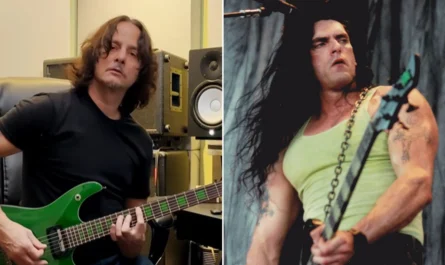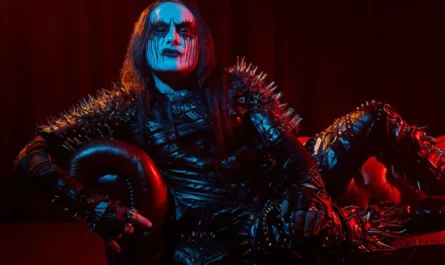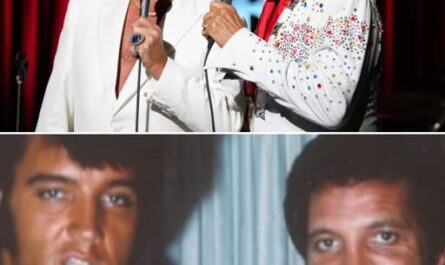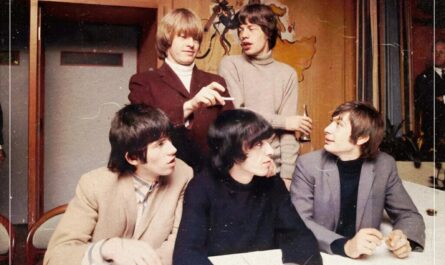Toni Morrison said all good art is political. Music is culture, and culture is the world, which is the politics that shape us. As comforting as ignorance might be, the fact is undeniable in 2025, and we can’t hide from it.
No one is operating on this knowledge better than War Child, a charity running the Day of the Girl campaign that uses performances to raise awareness and funds for 612 million women and girls worldwide living in conflict zones. This year, Girli, Katy J Pearson, and Mercury Prize winners English Teacher will lend their music to the mission.
It was through word of this incredible initiative that I found myself in a room with Pearson, her booking agent, Sarah Joy, and War Child’s Music Projects and Events Manager Feedy Frizzi. Swapping pixellated smiles and chatter, we sharpened the only weapon we’d brought to defeat the rabid monster that connects the misfortune of the girls and women at the heart of the initiative to our very own industry: the patriarchy.
How can we use music to push through the madness? What does real inclusivity and allyship look like? How can men most effectively use their privilege for good? If you struggle hearing the voice of one woman, how about four?

Why now?
The music industry is transforming into a largely unknowable and impenetrable beast. Frizzi is the first of us to admit it: some years ago, she knew exactly how to take an artist from zero to selling out London’s Village Underground. In the present moment, she had no clue where to start with the faceless algorithm, and not the omniscient music boss, behind modern success.
Yet, these dynamics are shifting while still attached to their very core to misogyny, sexism, and violence. At the same time, the general state of geopolitics is plummeting; in an industry newly obsessed with image, our stark reality seeps through gaps in our phones, depicting war zones and protests, and hope diminishing. Infographics bleat siren sound, reels show genocide and famine, and then, in the same breath, a sold-out show at Wembley.
It’s exactly this dichotomy that lies at the heart of our increased expectation of political engagement from creative industries. “Artists are at the forefront of culture,” Joy says simply, “I think people are starting to tap into that and realise that musicians have a platform to actually say what they’re thinking.”
Should politics and music really mix?
Leave politics to the politicians, the disillusioned might say. “It is shouting from the darkness,” Radiohead’s Thom Yorke has claimed, a form of “mechanistic” online manipulation that leads to “social media witchhunts”. To this, I’d say, no wonder Roger Waters has deemed him a “timid little man”.
In response, Pearson points me towards No Music for Genocide, the geo-blocking boycott initiative that the likes of Paramore, Lorde, Idles, and Björk, as well as Pearson and over a thousand more musicians, are a part of. The action is modelled on the success of cultural boycotts during the apartheid era in South Africa, a reminder that equal existence cannot be constituted without an unending string of unified protest.
Frizzi, too, shares that Day of the Girl has raised almost £250,000 across four years, which goes directly to financial aid, job training, specialist mental health support, and more. She notes a positive trend in artists’ investment in charity in the last few years, too. “There’s a lot of concrete help that comes from the industry, from artists,” she boasts, “And it’s growing”.
“Artists are really pulling their weight, and it does make a difference.”
Frizzi
There are options at every level: bands can get free card readers at their shows to encourage small donations on the door; they can add £1 to every ticket as a non-negotiable charitable donation; QR codes erected on the stage can encourage charitable engagement; merch donations are a huge help. For example, Westside Cowboy, an up-and-coming Manchester band that wowed Glastonbury audiences this year, has been donating a percentage of merch sales to charity.
There’s a sentiment that we’re fighting not just the tragedies overseas, but the depiction of activism and allyship as a form of surface-level political engagement, usually shrouded in a digital cloak: the ‘reblog, re-share, like, subscribe, done for the day’ mentality.
Music has always weeded out the weak, as, historically, it’s always been an industry where the going gets going, because releases won’t push themselves out. We need these people to show up doubly in times of humanitarian crisis and that time is now.

Is the industry really that sexist?
Sure, you might say, being a woman in music is hard, but Chappell Roan won big at the Brit Awards this year, and Shakira took home two Grammys in February, so what’s all the fuss? I raise you this: look back at those harrowing videos of Lola Young collapsing on stage in New York, clinging to her crew as she is shuffled off the stage. Look again. All men.
In fact, a study by Women in Live Music has estimated that the percentage of female crew in the industry is well under ten per cent in Europe. Pearson’s experience paints the same picture: “I’ve done so many tours where I’ve been the only woman,” she says, “Not having female camaraderie on the road can be really debilitating.”
She shares that her music journey began when she was only 15, when two very powerful male managers picked her up. She was “so young, and so naive”, attempting to understand a complicated power dynamic. As recently as 2024, a staggering 81% of women have said that navigating the music industry is harder for them than it is for men, and it is decidedly so.
Consider the historical image of the music agent as a man with a drooping cigar, receding hairline, heavy-set brows, and his feet up on a desk, puffing to an invisible tune, and contrast it to how I see Joy smiling gently at me in front of a wall of framed family photographs. The agent role is an “extremely tough, extremely cutthroat, extremely male-dominated role. It takes a certain personality type”.
“You have to battle to make yourself heard”.
Katy J Pearson
Joy talks lived realities, too: agent roles, as well as sound engineers, lighting engineers, tour managers, and so on, are impacted by pregnancy. It’s “really difficult to take a year out and get back into it with the same client base. You’re going to lose work”. It’s near impossible to balance being a sole caregiver in an industry so demanding, so controlled by male privilege.
But there’s another way to look at this, Joy insists, noting, “I sometimes think the female agents are, you know, great at their jobs, because they do understand their artists more”.
I’m a little more pessimistic about the industry at large, dreary from ubiquitous displays of male favouritism, egotism and violence. Still, Joy provides a welcome dose of hope. My voice, I say, is wearied from shouting twice as loud to be heard half as much. We hear you, she insists: “I’ve been in the industry for near 20 years now, and there’s more women than ever. It’s getting better, slowly”.

What does meaningful allyship from men look like?
By now, we all know the problem, but how exactly can things change? It ends right back where it started, with meaningful, impactful allyship from men. A strange fact came into focus as we leaned on each other for support: Behind each of our careers was a man opening the door for us. This isn’t a sign of weakness, but rather a sign of the times.
Coveted roles are consistently exclusive because of the exclusionary way we guard them, but creating is an inherently collaborative process, so if you have a door in front of you, open it, and hold it open. Pearson links this to her own production experience, reflecting on a time in her career when she became interested in the record process. “One of my friends said simply, ‘You can come and shadow me’. No one had ever said that to me before. There’s always been a barrier. I never knew removing the barrier could be so simple,” she expressed.
Joy shares some foundational considerations from an agent’s perspective: “Firstly, make sure you have a woman on your team, whether that’s within PR, management, or the label”. Bands should actively seek out women to represent them and include all forms of diversity. War Child’s secret? Around 95% of the office is led by women, hence their record-breaking profits seem less surprising now.
Second, an all-male line-up should be a thing of the past: “The worst thing you can do as a male band these days is have an all-male show and tour”. Seek out a support act that includes female, trans, and non-binary artists. In 2024, a BBC study found that 92% of headlining festival slots in Europe were male, and this number won’t shift unless the men on the pedestal want it to.
Pearson shares the male benefit of this approach, with her all-male band embarking upon lengthy tours with her, where she noted them being “more empathetic on the road”. It strikes us, then, that much of these tipping-the-scale initiatives teaches foundational ethics that might have been understood from an early age. Pearson says what we’re all thinking: “It’s all about just like early exposure for men to, from a young age, learn from women and build up skills that they are missing, emotional, regulatory skills that make them just more empathetic.”
Education is a means of eradicating the seeds of sexist ideologies before they grow into something sinister.

Yard Act and the paradoxical agency of choice
When I asked Pearson what it’s like to watch others react to sexism in the industry, she is quick to praise those who prove their unwavering allyship. “In the backstage green area, where you might see a person that’s been accused of sexual assault, I felt really safe with [Yard Act]. I’ve always found them to be a safe place to go.” Pearson’s discography boasts collaborative efforts with the likes of Metronomy and Yard Act, the latter of whom she worked with in 2024 on their single ‘When The Laughter Stops’.
Pearson spotlights an uncomfortable truth here: the industry is difficult for women not just on a symbolic representational level, but because it can be dangerous. In fact, the ‘Be The Change: Women Making Music’ survey identified the main challenge for women in the industry as persistent sexual harassment. In a world that typically runs in the nighttime, in the drunken spaces of dancefloors and dressing rooms, sexual violence is an insidious force rooted in the foundations.
It’s important, then, to praise the bands, like Yard Act, who are getting it right, not just quietly, but with their battalions at the ready. However, Pearson’s choice to join forces with a similarly politically-engaged group garnered some unusual attention. The singer-songwriter shares that she received plenty of comments asking why she had chosen to “collaborate with so many men”. We groan in unison as she adds, “Can we never get anything right? It just feels so counterproductive to challenge a woman on her decisions for her career”.
When the conversation finally ends and the screen goes black, I find myself staring at my own reflection, breathing in slowly the realisation that while I am a woman in a male-dominated industry, I am connected to these incredible women, and to this incredible cause, because we know that better is out there. And it begins with you.
Buy tickets for the Day of the Girl events here. Be sure to check out Girli at London’s Oslo on October 9th, English Teacher at Liverpool’s Hanger 34 on October 10th, and Katy J Pearson at London’s 100 Club on October 14th.





